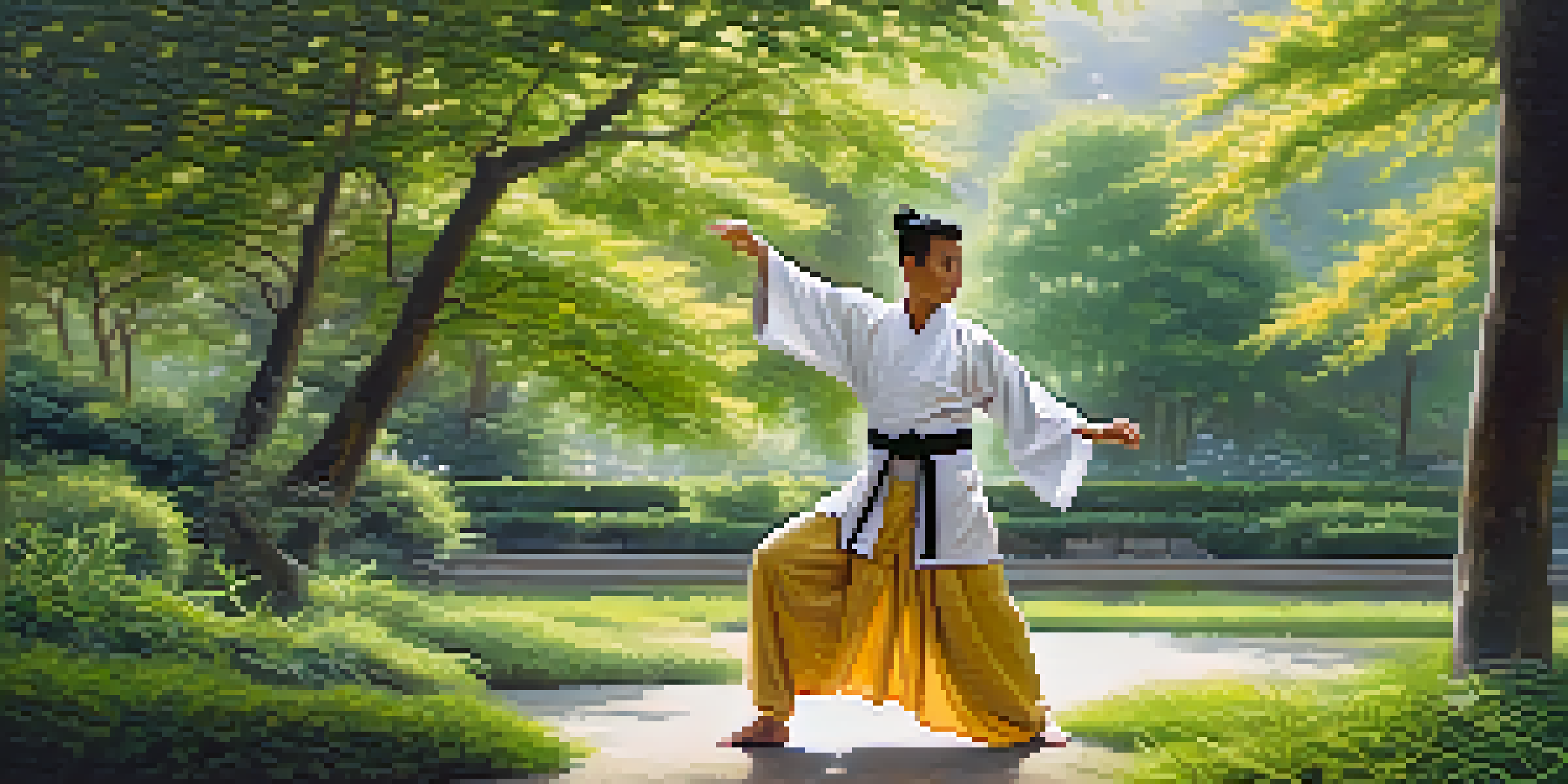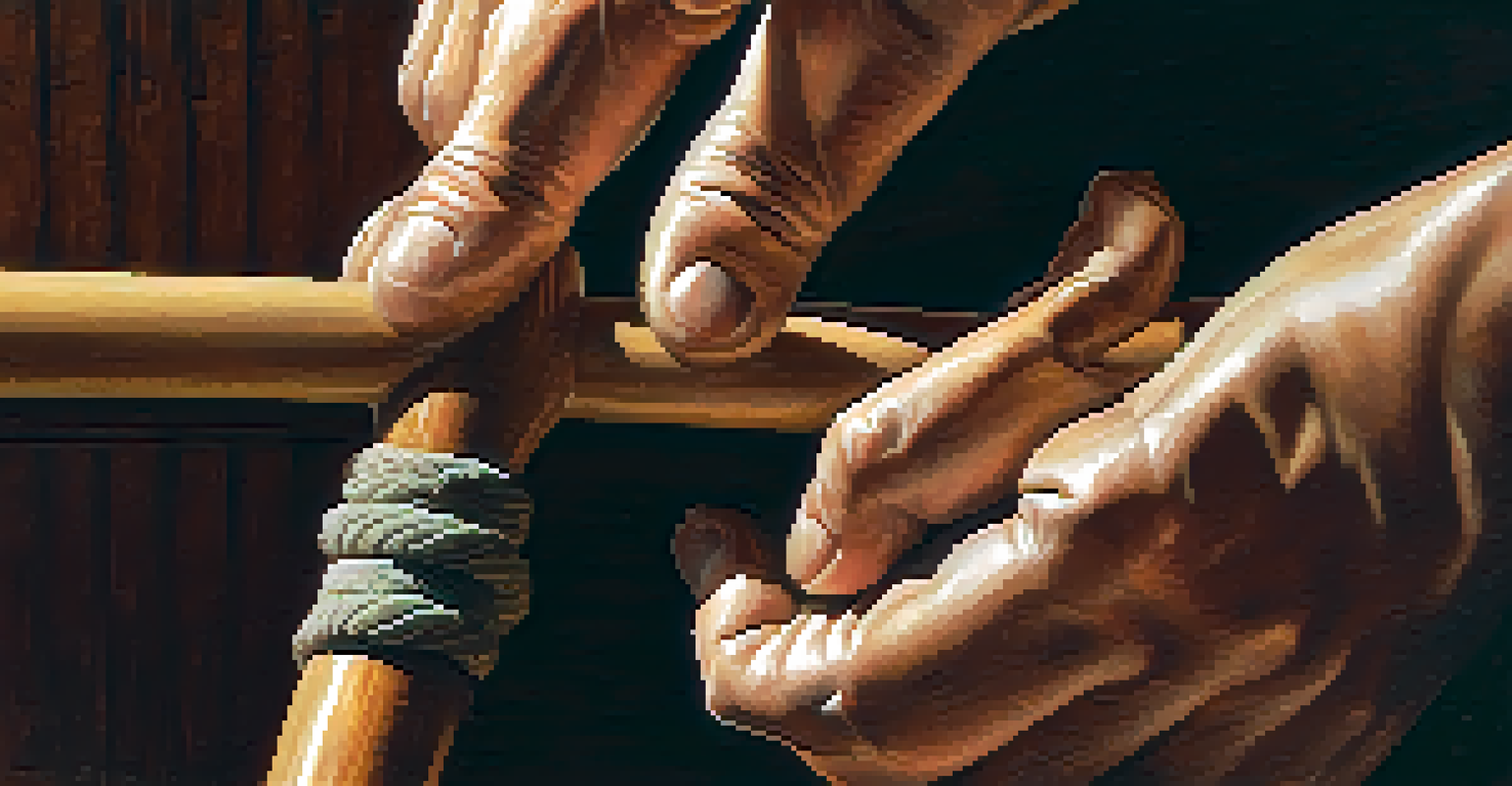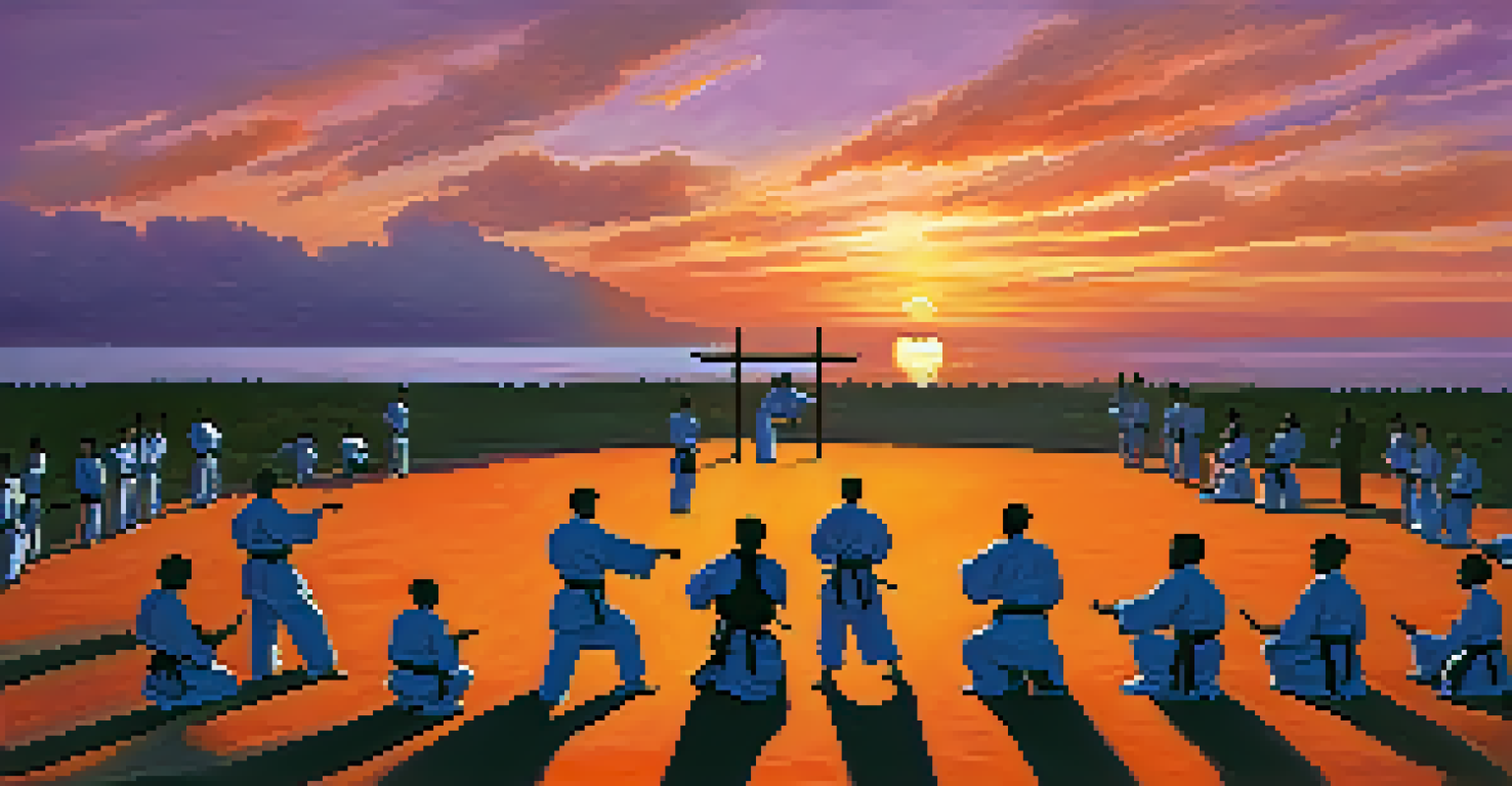Martial Arts and Philosophy: Their Historical Connection

Martial Arts: A Brief Historical Overview
Martial arts have a rich history that dates back thousands of years, originating in various cultures around the world. From the ancient Chinese practices of Kung Fu to the Japanese traditions of Judo and Karate, these disciplines were often developed for self-defense and military training. Over time, they evolved into complex systems that encompass physical, mental, and spiritual development. Understanding this history is crucial to appreciating the philosophical dimensions that have emerged alongside these martial practices.
The ultimate aim of martial arts is not having to use them.
These ancient practices were deeply intertwined with the cultures that birthed them, reflecting the social and political climates of their times. For example, Chinese martial arts were often influenced by Confucianism and Taoism, emphasizing harmony and balance in both movement and life. This connection between martial arts and philosophy illustrates how these practices served not just as methods of combat but as pathways to personal growth and enlightenment.
As martial arts spread globally, they adapted and incorporated various philosophical ideas, creating a rich tapestry of thought and practice. Today, martial arts are seen not only as a means of physical empowerment but also as a way to cultivate mental resilience and ethical principles. This historical evolution sets the stage for a deeper exploration of how philosophy continues to shape the martial arts landscape.
Eastern Philosophies in Martial Arts
Eastern philosophies, particularly those rooted in Buddhism, Taoism, and Confucianism, have significantly influenced martial arts. For instance, Taoist principles emphasize living in harmony with nature, which can be seen in the fluid movements of Tai Chi. This approach encourages practitioners to find balance within themselves and their environment, showcasing how martial arts serve as a reflection of philosophical ideals.

Similarly, Buddhism's emphasis on mindfulness and inner peace resonates throughout many martial arts disciplines. Practitioners are taught to focus their minds, enhancing their awareness and concentration during practice and combat. This mental clarity is not just beneficial in martial arts; it also carries over to daily life, promoting a sense of calm and purpose.
Martial Arts and Philosophy Intertwined
Martial arts are deeply rooted in philosophical traditions, shaping both their practices and the personal development of practitioners.
The integration of these philosophies into martial arts helps to foster a holistic approach to training. It encourages individuals to develop not just their physical skills but also their character and ethical understanding. By embracing these Eastern philosophies, martial artists can achieve a deeper connection to their practice and a greater sense of fulfillment.
Western Philosophies and Their Impact
While Eastern philosophies have played a significant role, Western philosophical thought has also impacted the evolution of martial arts. Concepts from Stoicism, for example, emphasize resilience in the face of adversity, which is a vital aspect of martial training. Practitioners often draw on these ideas to cultivate mental toughness and perseverance, crucial traits for overcoming challenges both on and off the mat.
Martial arts are not about fighting; they are about creating a better person.
Moreover, the influence of existentialism can be seen in the individualistic nature of many Western martial arts. This philosophical perspective encourages personal responsibility and self-discovery, allowing practitioners to create their paths within their training. Such an approach not only enhances the physical aspect of martial arts but also empowers individuals to explore their identities and values.
By integrating these Western philosophies, martial arts can adapt to modern societal needs and challenges. This fusion of ideas allows practitioners to draw from a diverse range of philosophical insights, enriching their martial journey and fostering a more profound understanding of themselves and their place in the world.
The Role of Philosophy in Martial Training
Philosophy plays a crucial role in martial training, guiding practitioners in their approach to both physical and mental challenges. The principles derived from philosophical teachings often serve as the foundation for training regimens, emphasizing virtues such as respect, discipline, and humility. These values not only enhance one's martial abilities but also cultivate a strong moral character.
In many martial arts schools, students are taught that the journey of self-improvement is as important as winning competitions. This mindset is rooted in philosophical teachings that promote continuous growth and learning. By focusing on the process rather than the outcome, practitioners develop resilience and a deeper understanding of their capabilities.
Eastern and Western Influences
Both Eastern philosophies like Taoism and Buddhism and Western thought such as Stoicism contribute to the holistic approach in martial arts training.
Ultimately, incorporating philosophy into martial training allows individuals to connect with their practice on a more profound level. It transforms martial arts from mere physical activity into a lifelong journey of self-discovery, encouraging practitioners to explore their beliefs, values, and purpose through the lens of their training.
Philosophical Concepts in Martial Arts Techniques
Many martial arts techniques are rooted in philosophical concepts that emphasize balance, flow, and adaptability. For instance, the idea of 'yielding' in Aikido reflects the Taoist principle of going with the flow rather than resisting. This approach teaches practitioners to redirect their opponent’s energy, highlighting the importance of harmony and strategic thinking in combat.
Additionally, the concept of 'Wu Wei,' or effortless action, can be seen in various styles, promoting a state of fluidity and grace during practice. This philosophical outlook encourages martial artists to move intuitively, allowing them to respond effectively to unexpected situations. Such adaptability is essential not only in martial arts but also in navigating life’s challenges.
By understanding the philosophical underpinnings of these techniques, practitioners can deepen their appreciation for the art and science of martial training. This awareness fosters a more mindful practice, encouraging individuals to embody these concepts both on and off the mat, enriching their overall experience.
Martial Arts as a Path to Personal Development
Martial arts are often seen as a pathway to personal development, where philosophy plays a significant role. The discipline and focus required in practice help individuals build confidence and self-esteem, empowering them to tackle challenges in various aspects of life. This transformative journey aligns closely with philosophical teachings that emphasize the importance of self-awareness and personal growth.
Moreover, many martial artists find that their training fosters a sense of community and belonging. This social aspect is crucial, as it reflects the philosophical idea of interconnectedness, reminding practitioners that they are part of something greater than themselves. Such connections can lead to lasting friendships and a supportive environment that enhances personal development.
Future of Martial Arts and Growth
As interest in mental health rises, the integration of philosophical insights into martial arts is evolving, encouraging a more comprehensive approach to personal growth.
Ultimately, the journey through martial arts is not just about mastering techniques; it's about cultivating a mindset that embraces growth, resilience, and compassion. This philosophical approach encourages individuals to strive for excellence while remaining grounded in their values, paving the way for a fulfilling life journey.
The Future of Martial Arts and Philosophy
As the world evolves, so too does the relationship between martial arts and philosophy. The growing interest in mental health and well-being has led many to explore the philosophical aspects of martial arts as tools for personal growth and resilience. This shift is encouraging practitioners to adopt a more holistic perspective, integrating physical training with mental and spiritual development.
Furthermore, as martial arts continue to gain popularity globally, there’s potential for new philosophical ideas to emerge from diverse cultures. This exchange of thoughts can enrich martial practices, leading to innovative approaches that resonate with modern practitioners. The dynamic interplay between tradition and innovation will shape the future landscape of martial arts philosophy.

Ultimately, the future of martial arts and philosophy lies in the continued exploration of their interconnectedness. By embracing both the physical and philosophical dimensions, practitioners can cultivate a deeper understanding of themselves and the world around them, ensuring that martial arts remain relevant and impactful for generations to come.